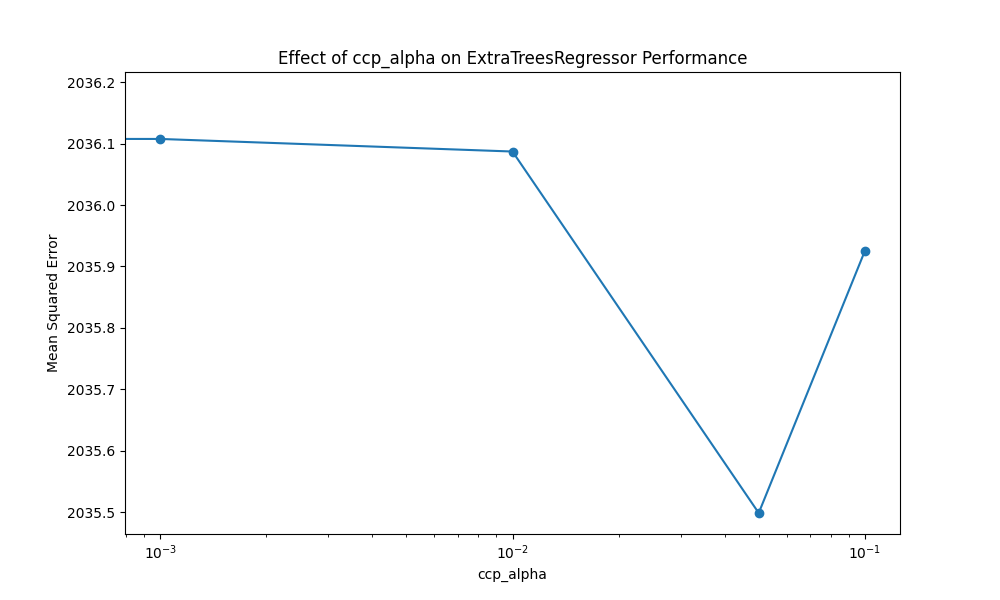The ccp_alpha parameter in scikit-learn’s ExtraTreesRegressor controls the complexity of the trees through cost-complexity pruning.
Extra Trees Regressor is an ensemble method that builds multiple randomized decision trees and averages their predictions. The ccp_alpha parameter sets the complexity parameter for Minimal Cost-Complexity Pruning.
Increasing ccp_alpha leads to more pruning, which can help reduce overfitting by removing branches that provide little predictive power. This often results in simpler, more interpretable trees at the cost of some predictive accuracy.
The default value for ccp_alpha is 0.0, which means no pruning is performed.
In practice, values are typically small, often ranging from 0.001 to 0.05, depending on the specific dataset and problem.
import numpy as np
from sklearn.datasets import make_regression
from sklearn.model_selection import train_test_split
from sklearn.ensemble import ExtraTreesRegressor
from sklearn.metrics import mean_squared_error
import matplotlib.pyplot as plt
# Generate synthetic dataset
X, y = make_regression(n_samples=1000, n_features=10, noise=0.1, random_state=42)
# Split into train and test sets
X_train, X_test, y_train, y_test = train_test_split(X, y, test_size=0.2, random_state=42)
# Train with different ccp_alpha values
ccp_alpha_values = [0.0, 0.001, 0.01, 0.05, 0.1]
mse_scores = []
for alpha in ccp_alpha_values:
etr = ExtraTreesRegressor(n_estimators=100, random_state=42, ccp_alpha=alpha)
etr.fit(X_train, y_train)
y_pred = etr.predict(X_test)
mse = mean_squared_error(y_test, y_pred)
mse_scores.append(mse)
print(f"ccp_alpha={alpha:.3f}, MSE: {mse:.3f}")
# Plot results
plt.figure(figsize=(10, 6))
plt.plot(ccp_alpha_values, mse_scores, marker='o')
plt.xscale('log')
plt.xlabel('ccp_alpha')
plt.ylabel('Mean Squared Error')
plt.title('Effect of ccp_alpha on ExtraTreesRegressor Performance')
plt.show()
Running the example gives an output like:
ccp_alpha=0.000, MSE: 2036.183
ccp_alpha=0.001, MSE: 2036.108
ccp_alpha=0.010, MSE: 2036.087
ccp_alpha=0.050, MSE: 2035.498
ccp_alpha=0.100, MSE: 2035.925

The key steps in this example are:
- Generate a synthetic regression dataset
- Split the data into train and test sets
- Train
ExtraTreesRegressormodels with differentccp_alphavalues - Evaluate the mean squared error of each model on the test set
- Plot the relationship between
ccp_alphaand model performance
Some tips and heuristics for setting ccp_alpha:
- Start with small values (e.g., 0.001) and gradually increase
- Use cross-validation to find the optimal value for your specific dataset
- Monitor the trade-off between model complexity and performance
- Consider using
ccp_alphain combination with other regularization techniques
Issues to consider:
- Higher
ccp_alphavalues lead to simpler trees but may reduce predictive accuracy - The optimal
ccp_alphadepends on the complexity of the underlying relationship in the data - Pruning can significantly impact model interpretability and feature importance
- There may be interactions between
ccp_alphaand other hyperparameters likemax_depth
